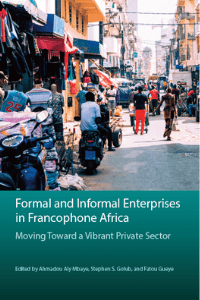While the duality of African economies is well recognized in economic literature, only a few comprehensive studies have examined the formal and informal economies using the same instruments. The research presented in this book uses a unique dataset carefully collected on both formal and informal firms, and an analytical approach based on a continuum of formality/informality characteristics, to analyze both private entrepreneurship and employment. Focusing on Francophone Africa, with particular emphasis on Benin, Burkina Faso, Cameroon, Gabon, and Senegal, the book also includes comparisons with other countries in Africa and in developing regions. The formal economy is shaped by institutions largely determined by their French colonial legacy, reflected in traits such as stringent labor market regulation. This, coupled with weak governance and high factor costs, prevents firms from growing and, thereby, incentivizes informality. Meanwhile, the informal sector is the major source of income and employment, typically accounting for about half of aggregate output and 90 percent of employment. Informal firms embody traditional economic practices, nurtured by deeply entrenched customs and well-established kinship networks, often spanning national borders. The book sheds light on some important and previously understudied aspects of the sector, using case studies, surveys and original data, and interviews. It also makes well targeted policy recommendations, taking into account firm heterogeneity and differentiated responses to various policy stimuli.
Learn more about the book.
Authors
Edited by

